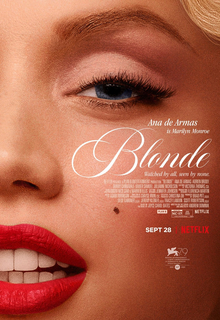BLONDE
I think it is absolutely important to remember that Blonde is not, I repeat, not a biographical film about Marilyn Monroe. It is an adaptation of a Joyce Carol Oates novel that imagines Monroe's life. As such, one can look on Blonde as a work of fiction inspired by real-life figures. Far too long and artsy for my tastes, Blonde is elevated by a dynamic central performance.
Norma Jean Baker has been haunted by the absence of her father ever since she was a little girl. After leaving the orphanage she was forced into and after her mother Gladys (Julianne Nicholson) is institutionalized, the now-rechristened Marilyn Monroe (Ana de Armas) aspires to be an actress.
To achieve this goal, Marilyn must endure anal rape by studio head Mr. Z (David Warshofsky) and a threesome between her, Charlie "Cass" Chaplin, Jr. (Xavier Samuels) and Edward G. "Eddie" Robinson, Jr. (Evan Williams) where she is anally raped again and a forced abortion. She also manages to fall in love with Ex-Athlete (Bobby Cannavale) who beats her after she films her Seven Year Itch scene where her skirt flies over her knees before screaming men. Another marriage to The Playwright (Adrien Brody) results in her losing another baby.
Finally, she is forced to both fondle and give head to The President (Caspar Phillipson) before dying alone.
I can see why there are those outraged by how Monroe is both portrayed and treated in Blonde. A lot of Blonde is hard to watch: the at-least two rapes (the ménage a trois appears to be voluntary until one of the Juniors starts going at her from behind), the President pushing her to suck his penis. As I kept watching this nearly three-hour film, I thought that compared to Monroe, Blanche DuBois was downright rational.
These elements were already hard enough, but what really pushes Blonde down is its length. At two hours and forty-six minutes long, it drags and ends up a bit boring. Her childhood takes up nearly twenty minutes and I imagine that writer/director Andrew Dominik could have either shortened or cut this section altogether.
If only to remove the scene where Gladys attempts to drown Norma Jean in the bathtub. Yes, Blonde can be fairly accused of being misery porn.
What elevates Blonde, what makes this very long, sometimes dry film worth anyone's time is Ana de Armas' turn as our bombshell. She is, in short, remarkable, brilliant, exceptional as Marilyn Monroe. Her performance is extraordinary. In the scene where she is auditioning for the female lead in Don't Bother to Knock, de Armas has to give two performances: one as Monroe, the other as Nell, the character Monroe is auditioning for.
It is a simply beautiful moment, the complex layers of playing Monroe and playing Monroe playing Nell is deeply moving. De Armas brings that pathos and haunted quality to the tragic portrait Blonde paints of Monroe. The scene where she begs to reconsider an abortion is heartbreaking (though again, whether this actually happened to Monroe is like a lot of Blonde a question of debate).
There are quite a few recreations of Monroe's filmography in Blonde, and it is to both de Armas and Dominik's credit that they come across almost seamless. The film recreates scenes from All About Eve, Niagara, Gentlemen Prefer Blondes and Some Like It Hot.The Playwright, for example, seems slightly amused and confused when Monroe mentions Chekov, but then is convinced of how well she understood his character when she remarks on The Playwright's creation of the female role. It is a pity that Blonde did not show us Monroe's triumph when playing the Playwright's lead. I figure though that by this part, the audience has accepted that Ana de Armas is playing Marilyn Monroe to absolute perfection.
Ultimately, Ana de Armas was sensational, but Blonde is both far too long and artsy for my tastes.



No comments:
Post a Comment
Views are always welcome, but I would ask that no vulgarity be used. Any posts that contain foul language or are bigoted in any way will not be posted.
Thank you.